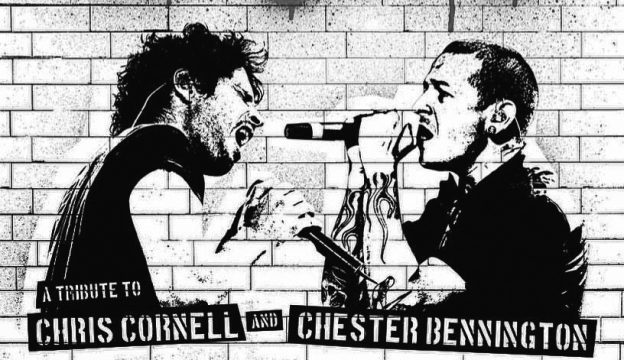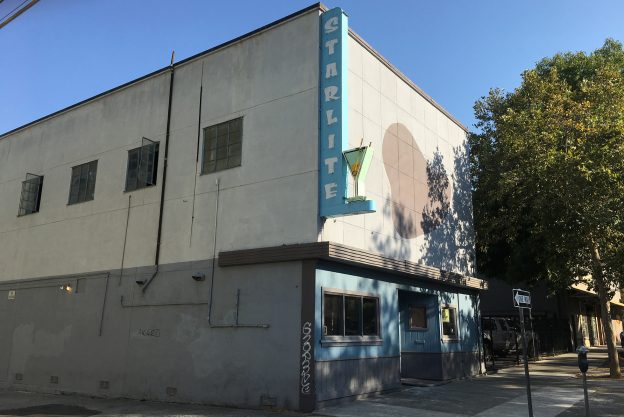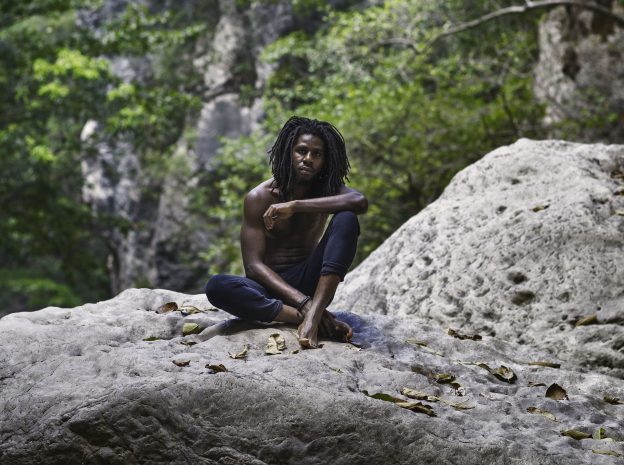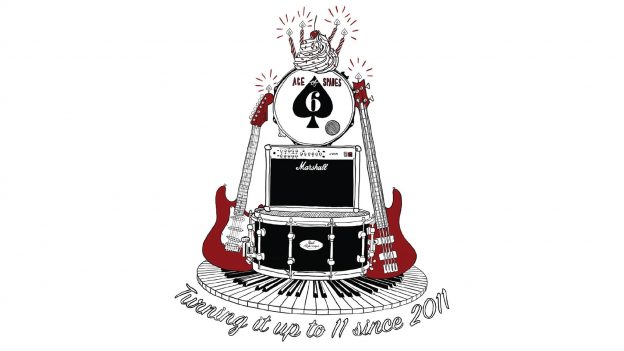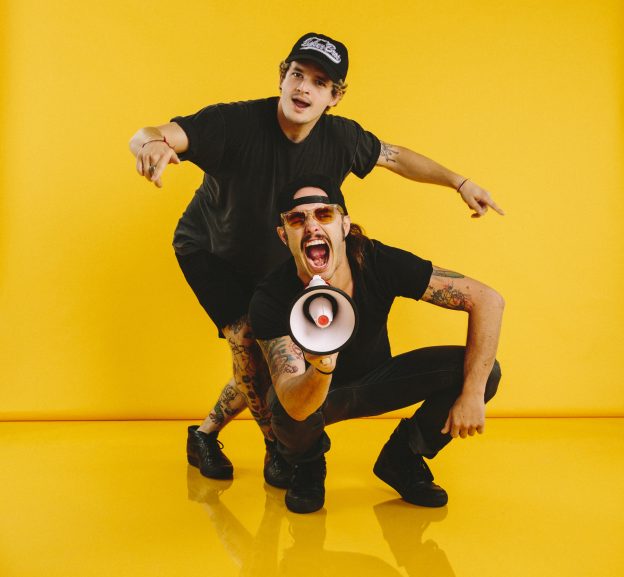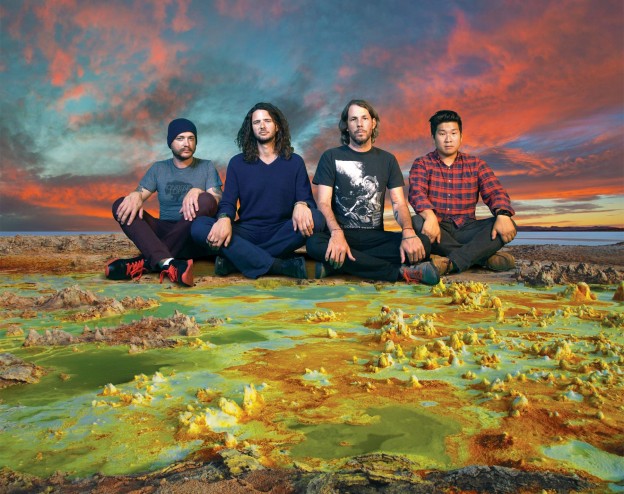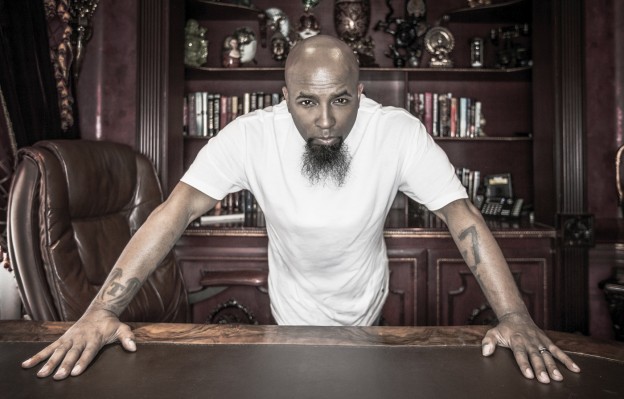It’s been a rough summer for fans of rock music. In May, Chris Cornell, an iconic rock vocalist most associated with the bands Soundgarden and Audioslave, tragically took his own life. And just last month, in July, Linkin Park vocalist Chester Bennington also sadly took his own life. The two high-profile deaths have sent shockwaves through the music industry and beyond, and although extremely sad and terribly tragic, if anything positive is coming out of it, it’s that this whole episode is shining a major light on depression, mental health, and suicide awareness/prevention. On Friday, Aug. 18, one of Northern California’s top music venues, Ace of Spades (1417 R St.), will host a concert that is being billed as, “Louder Than Love – A Tribute to Chris Cornell and Chester Bennington.” The event is designed in part to, “Shed light on suicide awareness and prevention with a focus on de-stigmatizing mental illness,” Ace wrote on their Facebook event page, going on to point out that 30% of proceeds from the concert will be donated to the Sacramento chapter of NAMI, the National Alliance on Mental Illness. A killer lineup of local rock bands have already signed on to play the event, including Pacific Skyway, Demon In Me, A Foreign Affair, Heat of Damage and others to be announced. Tickets are just $15 in advance, available through Aceofspadessac.com.
**This write-up first appeared in print on page 8 of issue #246 (Aug. 14 – 28, 2017)**
Some buildings just can’t keep quiet. Only a few weeks after it was announced that the downtown Sacramento music venue Starlite Lounge was closing (more on that here), we’re already getting word that the building will once again host live music in the not-so-distant future with a new name and a new management team.
Bret Bair, one of the forces behind the music venues Ace of Spades and Goldfield, among other local businesses, told Submerge today that “the ball is definitely rolling” for him and his team to take over the old Starlite building and start booking shows there under the new name Holy Diver.
“We hope that we’ll be doing shows there by Nov. 1, but there’s a chance it could be sooner,” Bair explained, going on to point out that they won’t be doing any “crazy, rebuild-the-whole-place type changes” to the building, but that they will be doing some cosmetic stuff.
Bair is also hopeful the venue will be able to host all-ages shows, stating that they will “work with the City of Sacramento on hopefully getting conditions that are similar to Ace of Spades.”
Originally, Bair and his team had planned on opening Holy Diver out in the suburbs, in a space that used to be called The Body Shop, but permitting setbacks and other hurdles caused them to jump at the opportunity to bring the project downtown.
“We plan on continuing the whole thing, you know, with bands upstairs, DJs downstairs,” Bair said of Holy Diver moving into the building downtown (which for many years before Starlite Lounge was known as The Townhouse).
“We’d like it to be a cultural epicenter,” he said of the space.
Keep it locked here and Submerge will do our best to keep you in the loop about when we can expect to Holy Diver to open. Bair and his crew also have a number of other projects in the pipeline, including opening a bar called The Cabin in a space near Kupro’s on 21st Street that used to be a tattoo parlor, and turning the aforementioned Body Shop space into a country bar called The Tackle Box. More on all that later, too.
For more on their other venues and to see upcoming shows they’ve got booked, visit Aceofspadessac.com and Goldfieldtradingpost.com.
When Butterscotch plopped down in my dining room, I noticed she was wearing a Tupac shirt, which shot me back to the ‘90s, when everyone was like, “Keep it real.” Remember that? No? That’s because you’re 12-years-old. Well, let me tell you a little something about the old days: They were stupid, and when people said “keep it real,” what they actually meant was, “Look mad as fuck and wear Timberland boots,” which led to entire suburban school districts full of kids who thought they were Tupac. But here’s the thing, not even Tupac was the cartoonish version of Tupac. Tupac Amaru Shakur was a poet, an artist, a dancer, a revolutionary and a thinker. In an interview from 1988, the 17-year-old said, “Ain’t no secret, the world is in bad shape. So we have to do a lot of good things.” It’s a beautiful thing for a teenager to say.
I’m always reminded that the reason people love Tupac isn’t because he wore bandanas and spat at cameras (OK, no, I actually love that shit); people love him because of his complexity, his commitment to intellect, and even his hypocrisy. Tupac was nothing if not authentic. He truly wanted to make the world a better place, and it wasn’t until people got in his way that he tried to destroy them. He was the perfect image of a beautifully imperfect human.
Peace, love, and positivity
That’s why I’m always excited to talk with Antoinette Clinton, known by most as Butterscotch, who seems to be in the midst of some sort of self-awakening, on the brink of becoming not just a musician, but a leader.
Over a glass of water (half full), she speaks candidly about the past several years since she was a finalist on America’s Got Talent, how she’s had to make difficult choices and her recent quest to find an authentic artistic self, a distinct path that will allow her to change the world on her own terms without having to bow to the god of mass appeal. “For 10 years, it’s been, ‘She was on America’s Got Talent!’ and I’m just like, ahhh, I’m more than that!” While she’s kidding, I imagine that kind of thing—being pigeonholed as a one-dimensional reality show character—can really be frustrating, especially since the guitar-and-piano-playing, beatboxing-and-rapping virtuoso has been working hard to gift the world with her grand artistic gestures.
“I fully feel who I am and what I’m supposed to do and my purpose. It’s to inspire and I know that a lot of people have gone through the same things as me and it’s to give motivation and purpose to others and to encourage them to keep going,” she says. “And also just to make them feel good.”
She also understands that in order to make fans happy, she has to be happy, too. “I’m trying to do more things that not only help me grow, but that are fun and that inspire me. I’ve done corporate stuff which pays really well, but it doesn’t feed the soul,” she says.
“I’m trying to do more soul-fulfilling events.”
Narratives
While she’s been out as a gay woman for about 10 years, Butterscotch wasn’t always super open about it. She never hid the fact that she was gay; she simply didn’t talk about it.
“It’s not easy when the majority of the world is judging you and you have to be super comfortable and confident to know that’s who you are,” she says.
She recently performed at SF Pride and will perform at DTLA Proud Festival at the end of August, and her single “Accept Who I Am” marks a sort of turn in her career where she is not simply “out,” she’s claiming her sexuality and drawing a line in the sand in the name of LGBTQ people. The second verse of the song is where shit gets heated: “It’s none of your business if I’ve slept with a woman or a man/ Frankly I don’t give a damn what you think, I’m a freak, what I do in the sheets, doesn’t concern you, I don’t/ understand, why you care so much, why do you people stare so much, why you point and glare so much,/ Like you’re the one to judge/ Living your fucked up life you can’t get enough.”
Damn.
Her latest single “We Are All We Got” is equally as civic-minded, with an attention to human connection and a call to spread your narrative throughout the world, even if that narrative causes discomfort.
“We’re told that we’re ugly because we’re black or we’re told that we’re sinful because we’re gay, and people have committed suicide for these reasons, so we have to celebrate ourselves to appreciate ourselves,” she says. “It’s more important than ever to share our stories.”

The AGT curse
I have a feeling that no matter where she goes, Butterscotch will always be the one from America’s Got Talent, which is why she’s wary about the many offers she’s received to be on other televised talent competition shows. “I’ve been approached several times. I don’t want to be known as that,” she says.
But that doesn’t mean you’ll never see her on TV again. “If it was about music and would focus on my story, then sure,” she says. “The only thing is that people thrive on drama, so it would have to be carefully crafted. But I’m a pretty open person.” Butterscotch pauses. “Well, semi-open,” she says, laughing.
This careful weighing of opportunities (“I’m not that much into astrology, but I’m a Libra. I weigh everything,” she says) is something that’s foreign to someone like me, a garbage human born with zero self-control (I’m a Gemini). If someone offered me a reality show, I’d probably buy some bigass sunglasses, quit my job, move to Los Angeles and never speak to normal people again. But since Butterscotch has a highly functioning brain, she is able to weigh each opportunity with the help of her girlfriend, who asks a simple question: “Would you be proud of it?” It was this question that led Butterscotch to pass on the opportunity to appear on Showtime at the Apollo. If it’s just for exposure, and not contributing to the nourishment of soul, she won’t do it.
Industry rule No. 4,080 …
“It’s a rough industry,” Butterscotch says about showbiz. “Fortunately, I’m pretty good at networking.” This talent has led her to perform at the Hatch conference in Montana, where creative professionals (filmmakers, artists, entrepreneurs, the guy who created Siri, etc.) gathered to listen to each other talk and to trade ideas.
Her knack for networking also led to one of my favorite Butterscotch appearances, her 2016 talk at the Peace of Mind Storytellers event, where she addressed mental health issues and how art helped her overcome some serious shit. “I used to cut my arms all the time. It was a deep and dark time for me,” she said in front of the crowd. She talked about how music saved her life, but also how she had mentors that told her she should stay in the closet, that she “should get a fake boyfriend.” She fell into a deep state of depression and wondered if music was the way. “I wanted to shave my head and move to Spain,” she joked. Her willingness to spread her narrative with grace and humor and to commit her life to assisting others has helped her deal with her own demons.
“In the end, it’s just like, fuck it,” she says, “so you might as well love your life and do what’s best for you.”
It’s exciting to fathom what’s next in Butterscotch’s quest toward self-fulfillment. No doubt she’ll extend her generosity toward youth who need it the most: the depressed, the unsure, the outsiders, the outcasts, the humans who feel like they need a purpose and can’t find one. For these souls, Butterscotch offers a bit of advice: “Find your support system, whether it be a teacher, a friend, a family member, there’s always going to be someone out there who does understand and people that will help, even if it’s me,” she says. “You can reach out to me.”
That’s real.
Catch Butterscotch at the Girls Rock Sacramento Benefit Concert presented by the California Women’s Music Festival on Saturday, Aug. 5, at Ace of Spades, located at 1417 R. St. in Sacramento. General admission tickets for the show, which also features new wave mainstays Missing Persons and an array of local acts, are available in advance for $25 at Cwmusicfest.com or Aceofspadessac.com.
Combining music, dance and stunning visuals, Lucent Dossier has shared the stage with diverse acts, from Christina Aguilera, to The Flaming Lips, to Mötley Crüe and have even performed in front of the Dalai Lama (you know, no big). On Aug. 4, 2017, you’ll be able to witness their latest show up close and personal at Ace of Spades (1417 R St., Sacramento). For a taste of what you may be in store for, go to Lucentdossier.com and check out the trailer on their home page. You’ll see gorgeous dancers twirling fire, aerialists, fireworks and extravagant costumes … pretty much the kind of stuff that will have you oohing and aahing all night long. Tickets start at $32, but you can purchase four for the price of three through Aceofspadessac.com. If you’re looking to expand your nightlife horizons, this is the event for you. Also performing will be special guests Thriftworks and Phutureprimitive.
There is often a fundamental schism between the lovers and the makers of art. As a fan, there can be an urge to let your inner archivist run rampant; to discover obscure genres or codify new ones, deciding who belongs where. For journalists especially, the slightest hint of a new “scene” or “movement” is like blood in the water. That is not to say our intentions are hostile, but even so, our pronouncements can be limiting to the unfettered artistic mind. To declare what is rising or waning, to construct lines separating the “old” and “new,” can seem to the artist like an attempt to place toll on the limitless road of creativity.
Chronixx is well aware of this. In the supercharged, creatively brimming musical climate of Jamaica, where success does not go unnoticed, the artist born Jamar McNaughton has found himself near the epicenter of a young generation of artists who make fresh music with a timeless spirit and are bringing attention back to a more conscious strain of reggae. Because of this, no interview, inquiry or thinkpiece he’s been involved with in the past four years has been able to ignore the alluring, exciting narrative of a “reggae revival” in his island nation, stirring a sea change from the relentless, mammonic drive of dancehall to a renewed focus on roots, people and empowerment.
As is always the case, there is a little bit of truth to all this, but the real story is both smaller in scale and deeper in reach. Chronixx, and fellow artists like Protoje, Jah9, Kelissa, Kabaka Pyramid and Jesse Royal (the list goes on), have no master plan to conquer the world. They would much rather make tunes together, show up at each other’s gigs, and genuinely affect people with music, whether it be one hundred or a hundred thousand. As he would put it, it’s about the love, not the likes.
Chronixx’s roots denote more than his conscious stance and Rastafari lifestyle. He was born into a music family, spinning his name from his father’s own stage name, Chronicle. He’s had a hand in the studio and on the mixer since his early teenage years and was raised among a who’s who of Jamaican musical royalty. Though his diet may be strictly ital, he has a wildly omnivorous ear, soaking up the propulsive riddims of dancehall along with the music that came before it, and listening to the heavenly harmonies of Enya extensively while on tour.
It’s always best to keep your tastes complicated and your approach simple, and Chronixx aims to do just that; building up to his proper debut album, Chronology, he has kept his humble, direct ethos intact on singles like “Smile Jamaica” and ‘Majesty” as well as his 2014 EP Dread and Terrible, even as they propel him towards global fame, including two recent appearances on The Tonight Show Starring Jimmy Fallon. In the meantime, he continues to acknowledge the power of music to transcend political and mental stagnation while avoiding being overtaken by the hype that travels in his wake. Chronology in part refers to the rising spirit of the times, and of Chronixx and his musical compatriots. It is also an idea he gleaned from a history book: our ordering of history is often false, and where we have once assumed a lineal succession—one ruler coming after another, one dynasty toppling the last—we often find that, in reality, there were many rulers, reigning concurrently in relative peace. For Chronixx and his generation, I and I know the reign will be a long and fruitful one.
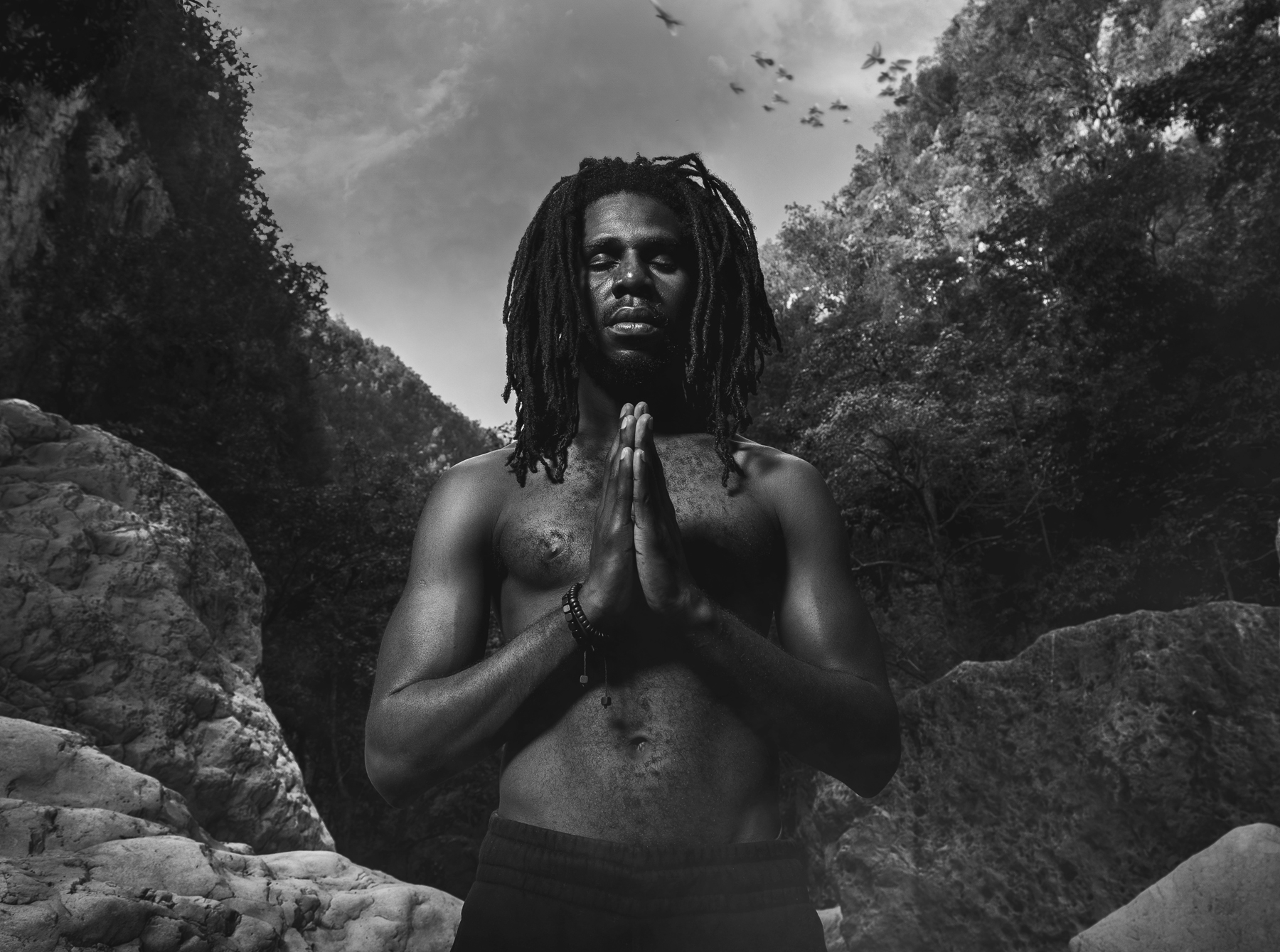
Why do you think reggae has had and continues to have such a global appeal?
Reggae music is deeply rooted in consciousness, and that for me explains the widespread appeal. Consciousness is something that cannot be contained. Even though reggae music has not really been accepted in the mainstream structure and the mainstream institutions, it is one of the only kinds of music in the world that doesn’t have to be in the top 100 in order to fill festivals with tens of thousands—hundreds of thousands—of people that come to watch every year. Regardless of the number, the people who come out are fully into the music, they know the lyrics and everything. Reggae provides something for people that they cannot find in any other kind of music, which is a comfort from the pressures of the system, a relief and a release from the pressures that society may inflict. Because it has that quality, it catches on naturally. People know what they want and even if it’s not given to them, they’ll find it.
It’s not about the popularity or what is new, louder or faster, it’s the feeling.
Yeah, it moves in a more organic fashion, and it moves slower—in terms of how popular the music gets, the months it takes to reach people in other genres and other countries. In those places, if a song doesn’t break in the first year it’s released, then that’s it, and you move on to the next thing. In Jamaica, you can have a song from 1985 that suddenly becomes very popular in 2017. And that’s the nature of music, the relevance never goes away. Sometimes it feels like it does, but the relevance keeps appearing and manifesting in new ways.
How do you deal with success without compromising your spiritual beliefs?
It happens when you don’t focus so much on success. I try to redefine success on an inner level. I know what success means in the world—I accept that. That is what the world perceives as success, but as far as me and my faith, I redefine it as having your music serve a purpose, which is to uplift and inspire people. Not having a specific number or amount—even if you inspire one person, lift up their life, on a soulful level, so that they are never left the same—I think that’s a very powerful thing. That can’t be considered unsuccessful by anyone who is trying to reach people.
Do you agree that there is a “resurgence” or “revival” of roots reggae?
As far as the resurgence of reggae music is concerned—let me tell you about that. I grew up in a music home, nah mean? My father is an artist, and I grew up listening to all different kinds of music. From when we were children, we considered ourselves to be musicians in training, like, we were always trying to learn new songs, trying new instruments. So from that stage I realized that music is just all in a continuous thing. I can tell you, I think reggae in every period, every year in Jamaica, it feel like the media says and does things for their own benefit. If you just write about the reggae artists, you can do it for a time, but then it becomes boring, so you have to write it in a different way, you have to say, “these brand new reggae artists who out of nowhere have come with a resurgence.” And if you’re gonna talk about a resurgence, I feel like you are now saying that there wasn’t great music being made all along. And there has been, for every single period of my life.
The difference with our generation is just that we weren’t in the scene before now. The music just needed new artists, it’s not like it needed new reggae music—reggae wasn’t dead, it just needed new people with fresh ideas. Our music was already there for like 50 years. For music to survive, new birth have to take place. And for birth to take place, certain things have to happen. We can’t ride media waves, because media waves fade away. If you ride the wave that fades away, it will move on to something else, in the next two years or in the next six months. The greatest thing is to stay true to what you’re doing, and remember that you were doing it before people gave it a name or called it a movement. Just continue.
Would you say the current musical environment is more about cooperation?
Yeah, and we are still finding new ways to collaborate. The thing is, most of us are independent—we are challenged by our inexperience, we are challenged by our limited resources. These challenges are sometimes really positive: we have to be more creative and learn how to do more with less. We’ve always been collaborating, even sometimes when we are not trying to. Like, for instance, I’ll have a show in Jamaica, and even without trying, my performance end up having six to 10 guest musicians. And there’s all these other kinds of artists that come up in this [movement]—photographers, directors, guitarists, drummers, bass players, singers, writers, producers—who are now emerging, who collaborate sometimes without even realizing.
How would you describe your album Chronology and the idea behind it?
I consciously made the decision not to judge or have any expectations of this album in terms of my career—it wasn’t a career project. It’s just something that I really needed to do. And I guess the music will reflect that. I didn’t do this to celebrate what happened in the media a few years ago with the “resurgence of reggae music.” It’s not one of the albums that come out of that in any way. I didn’t put it out because I need to have something playing on the radio. [Laughs] It makes me nervous—I know people will appreciate it for sure, because all people want is inspiration. But in terms of the industry and the career aspect of it, I’m not sure how much my career will benefit from this. But it’s something I really needed to make, and that made it important. I did it and I enjoyed it, and I’ve never experienced such growth as a musician ever in my life.
It’s called Chronology because I was reading a book showing history, from Egypt come to now. Basically, history keeps changing, and as we grow we keep hearing about planets that we haven’t heard about, we keep hearing about kings and queens from long ago that we didn’t hear about. There was a concept in the book called the new chronology, where some new scientists recently found that the kings of Egypt and the queens of Egypt, a lot of them were ruling concurrently, and not one after the other. A lot of the people that we thought were usurped or overthrew the other were actually ruling together, like five, six kings and their queens at the same time. I think in music, this whole thing of chronology is showing that yo, I didn’t really come after he, and he didn’t really come after me, and they didn’t really come before we. We all are doing this at the same time, we are carrying the energy and pushing it and Jamaican music forward. I say Jamaican music because we can’t overstate reggae, we can’t overstate ska. It’s the same thing. When you look at chronology, when you look at the history and art of Jamaican music, you’re saying, “Alright, it was ska, and then it was this, and then it was that.” But there was a time that ska and rocksteady were happening at the same time, if even for a short period. You have Toots [from Toots and the Maytals] who out of his performance of traditional Jamaican folk music mixed blues and funk, and all of those kind of music—he came up with reggae. And then you have a lot of Spanish music influence in our music on top of that. I personally have spent my whole life trying to learn the truth about our music, and this album reflects that 100 percent.
So, it’s not for people that look up and listen to five songs and think they know what reggae is. This album is for you to humbly listen to music with your heart open. Don’t try to label it, you may just find out something very interesting. Just open your heart and listen to the words and the instruments. You might just hear something that you never hear before.
Chronixx joins special guests Max Glazer and Jah9 on Tuesday, March 21, 2017, at Sacramento’s Ace of Spades, located at 1417 R. St. Tickets are $24 in advance ($27 at the door) and available online at Aceofspadessac.com.
One very lucky Sacramento-area concertgoer is about to receive the ultimate gift from Ace of Spades, a popular all-ages music venue in downtown Sacramento. To celebrate their sixth birthday, the venue is running a sweepstakes where the winner will receive a pair of tickets to every show at Ace for the rest of 2017! They’ve already got some amazing shows booked in the coming months (Whitechapel, Social Distortion, Keys N Krates, Dance Gavin Dance, STRFKR, Beats Antique and Jimmy Eat World, just to name a few) and there are sure to be dozens more added in the coming months, so the winner will be sure to have a great year. To enter, visit Ace of Spades’ Facebook and/or Twitter pages (their handle is @AceOfSpadesSac on both platforms) and look for their posts about the contest, which will have a link to follow where you’ll fill out a brief form. You must be a legal resident of California, live within 100 miles of the venue (located at 1417 R St., Sacramento), and be at least 18-years-old. Make sure you enter before Feb. 24, which is when the winner will be chosen. Learn more about the venue, upcoming shows and more at Aceofspadessac.com.
EDITOR’S NOTE 8/17/17: PLEASE READ THIS UPDATED ARTICLE! “HOLY DIVE BAR” IS NOW OPENING DOWNTOWN IN THE FORMER STARLITE LOUNGE BUILDING AS “HOLY DIVER!” CLICK HERE TO READ MORE!
Sacramento-area concert goers in the 21-and-under crowd will soon have one more option for a night out with the opening of a new all-ages music venue in Sacramento. The team that brought us Ace of Spades, a popular 1,000-plus capacity club in downtown Sacramento, plans on opening a new all-ages venue “sometime later this year,” according to partners Bret Bair and Eric Rushing. The new venture will be called Holy Dive Bar, and while details remain sparse at the moment, Bair and Rushing have confirmed with Submerge that they do have a location picked out. The new venue will be comparable in size to The Boardwalk, which they no longer are operating. Holy Dive Bar’s exact location will be announced in the coming months, but we can confirm that it is not downtown but somewhere “in the burbs.” By the looks of it from the venue’s Facebook page (Facebook.com/holydivebarsac) it looks to be somewhere in the area of Madison Avenue and Auburn Boulevard. According to Bair, Holy Dive Bar will “cater to the local scene as well as up-and-coming national acts,” going on to say, “We’re doing it for the kids!” This is huge news for the local music scene! We’ll try and keep our readers informed of updates on this new venue. In the meantime, check out their other shows at Ace and Goldfield.
More than a decade after the completion of the Human Genome Project, the world’s best minds have only just begun to unravel the DNA of the pop hit. The combination of science, art and psychology required to craft a self-perpetuating earworm is far beyond the reach of most mortals. There is simply no telling when lightning will strike the bottle.
This is exactly what happened to Jason Huber and Jordan Kelley of Nashville duo Cherub in the summer of 2014 when their crowd-pleaser, “Doses and Mimosas,” already two years in circulation, hit the Billboard Rock Airplay and Alternative Song charts simultaneously, creeping across the country and later across the world from one house party to the next, becoming an international sleeper success. After two more summers of near-constant touring, with audiences in Paris and even the local crowds at TBD Fest singing along to their wry ode to champagne and cocaine, the duo is keen to add more substance to their multigenre cocktail of a sound.
With 11 new tracks, including one with a guest spot from rapper T.I., Cherub’s new album Bleed Gold, Piss Excellence (out Oct. 14, 2016) aims to break through to the other side of their cult success. From start to finish, it sets out to revise their hedonistic vibe with an undertow of moody grooves, and succeeds in updating their sound—a digest of throwback party vibes recalling different eras (early ‘80s electro-funk, mid-‘90s trip hop, late ‘00s indie dance and current-era millennial club jams)—this time with more tonal shifts.
Cherub will be hitting Ace of Spades on Nov. 9, 2016, in the middle of their ongoing 50-date tour, with the promise of new fall bangers alongside classic summer jams. Veterans of TBD 2014 can relive their steamy set from that sweltering fall so long ago, and find new to love in the next-level Cherub of the present day.
We were able to drop a line to the duo between gigs in Arkansas, with Kelley temporarily without a voice and Huber taking the role of spokesman, giving his take on the phenomena of hit songs, meeting T.I. and the decision to go electronic.
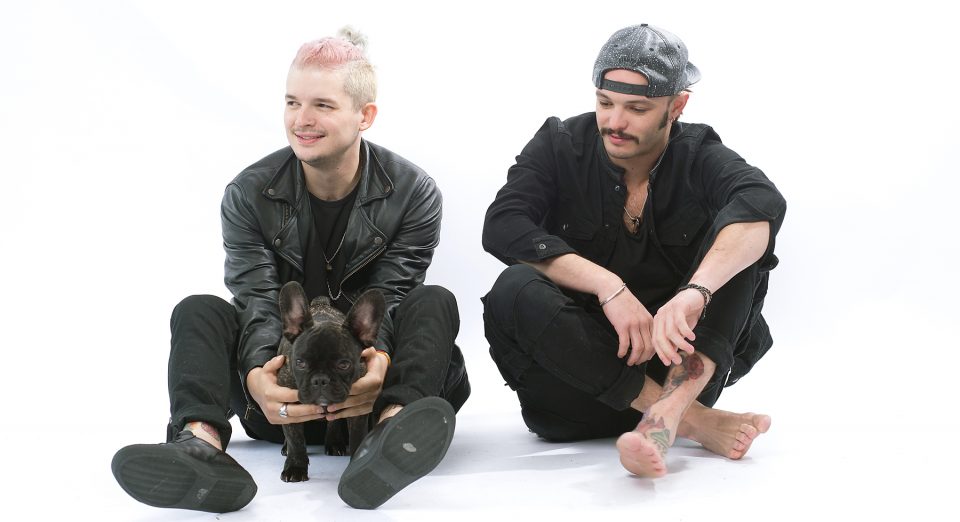
Photo by Ford Fairchild
What’s your take on the runaway success of “Doses & Mimosas?”
The whole thing about that song is that we never picked it out to be a single. We originally recorded it for our record Mom and Dad, and when we released it, we put it out as one complete work from start to finish. We didn’t highlight a specific single. From that point, people started to react to that song. After we went out on tour, we thought that everyone had heard it, it wasn’t new anymore. Then all of a sudden people started playing it on the radio in California and it became more of a nationwide thing and widely recognized, as opposed to an underground, viral thing. Then the record label came into play and released it on this whole new scale, and then we had people in Paris start to play it. We got the opportunity to go over to Europe and tour internationally. There’s been multiple times throughout the lifespan of that song that Jordan and I have assumed that everybody has heard it that’s going to hear it and it’s old news, and then all of a sudden, it will grow another set of wings. It makes us realize how small our individual bubble is compared to the rest of the world, and it’s really cool to be able to have something as direct as that song to reach the world.
How did you begin the follow-up to that initial success?
When we were going into the studio to make the new album, we didn’t go in with any sort of preconceived notions or any one specific goal. We didn’t try to recreate the same magic that happened on previous songs. We’re really trying to go in and write some good music that first and foremost connected with us, but also connected with other people and played as a solid album, and not just a random collection of singles.
That’s always been our goal when we go into the studio, and we don’t think about too much other than that. We’re obviously inspired by our fanbase and the people that are coming out to shows and singing the songs, and the reaction that they’re giving us. But there isn’t really a specific goal going into the studio. It’s just about making some music and seeing what fits in.
How did the collaboration with T.I. get started?
It’s something that happened pretty organically, surprising as that may be. That’s pretty much how all our collaborations have happened; it’s not been something that’s been forced from our side or the other. It’s just us getting together and making music with people we enjoy spending time with. That specific collaboration happened when T.I. was introduced to [our] music randomly, and from that point he became a fan. He made a point to come out to one of our Atlanta shows. He was super nice; he invited us out to dinner and bowling with his family the next day. Then we got into the studio tracking for what we hoped was going to be on of his releases. We came back down again a couple of months later and then we tracked for our record. It was a really cool, organic relationship. And it was an insane thing for us, because we had both grown up as fans of his music.
At what point in your career did you have a “we’re making it” realization?
Probably going into Columbia’s offices and seeing our picture on the wall in between Bob Dylan and Beyoncé, just seeing us at a major label being associated with the greatest of the greats, that was an awesome and very humbling experience. It’s especially awesome because we haven’t had that cliché major label horror story happen to us, where a band goes in and they feel like they have to compromise what they’re doing and change everything. Our process throughout the whole experience has been really unimpeded. They just kind of magnify what we’re doing as opposed to trying to change it.
What was your first brush with electronic music?
I really got into electronic music through college. I specifically remember going to see this show, the after party for a band with an electronic set, and just thinking, “This is really cool,” being able to produce music onstage that is unattainable sonically as a rock band. That experience, and going to a lot of music festivals really opened my eyes to how this music can be performed. It made me realize that people performing electronic music don’t have to worry as much about what can happen technically as they can worry about the audience experience and the entire show itself. Some people are sacrificing the show just to be doing absolutely everything instrumentally. Picking those battles of what to focus on can be the hardest thing—that was a real turning point in my life, I think.
Do you aim to place a lot of humorous themes in your style and music?
There’s always been a juxtaposition in all the lyrics throughout the records. There’s obviously a lot of sincerity in all of it, but some of it is right alongside this kind of tongue-in-cheek quality. Our whole mentality is to take ourselves seriously, but not too seriously, which is kind of the way we live our lives, and it shines through in the lyrics as well.
What is the best way to experience Cherub?
Come to the live show. We play a solid mix of songs off of all the records, and really, the thing that has kept this whole act going is the fact that, we started playing shows for five people, then they told their friends and 50 people came out, and now we’re getting the chance to play to hundreds and thousands of people. We’ve been touring consistently for about six years, and we’ve got a schedule where, during the winter/spring time we’ll hit half of the country, and be complaining about not hitting the other half, and then come the fall time we’re touring the other half as well. It’s huge, the string of dates we’ve put together this time. This is the most extensive tour that we’ve done, and it’s awesome to get to go and revisit these places and these friends that we’ve met along the way. You meet people every day, and we made a lot of friends out there, so getting the chance to go see everybody is awesome.
Catch Cherub Nov. 9, 2016 at Ace of Spades, located at 1417 R St. in Sacramento. This all-ages show kicks of at 6:30 p.m. with openers Frenship and Boo Seeka. Tickets are $23 in advance or $28 at the door and are available at Aceofspadessac.com.
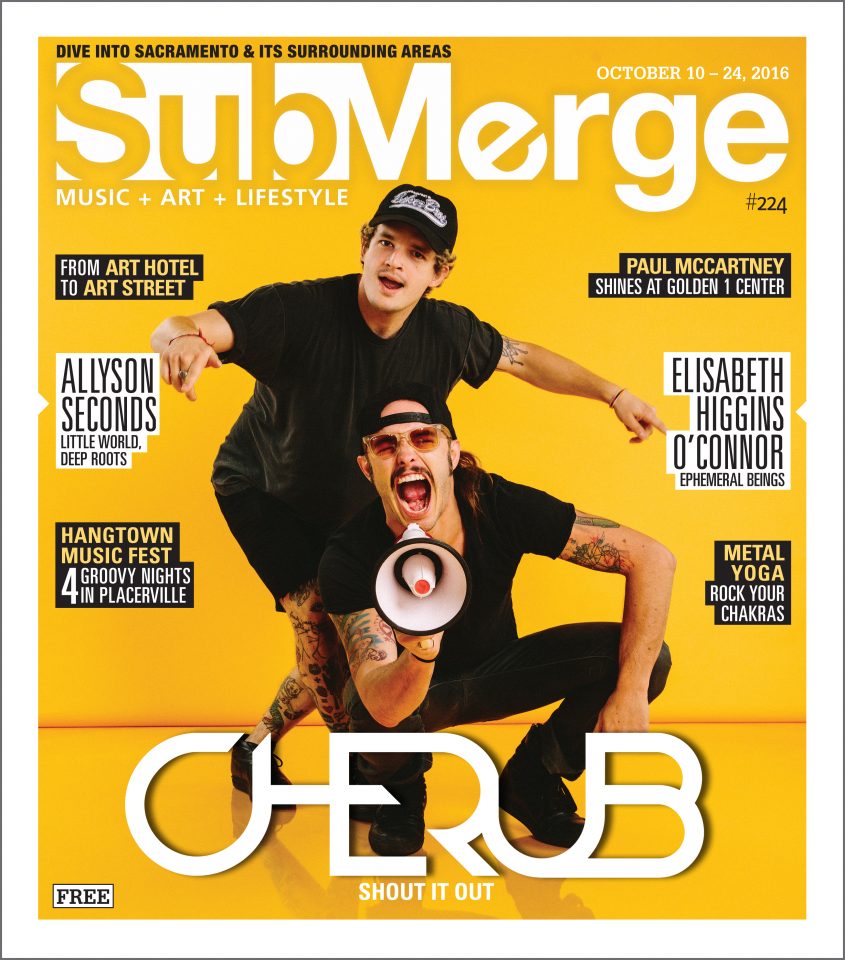
In the summer of 2006, RX Bandits released their fifth album, titled …And the Battle Begun.
That was 10 years ago, a time when the music industry (as a profit-generating entity driven primarily by CD sales) was clamoring for ways to fend off its impending death-by-advancing-technology. Online piracy and the iPod were shredding the major labels one miserable fiscal quarter at a time, and no rabbit they could pull from their hat could stop it.
With this scene as the backdrop, RX Bandits were poised to deliver an album they were immensely proud of, and yet they were weathering their own set of personal storms as well. One had to do with their record label, Drive-Thru, which simultaneously gave them an audience at a very young age, but also pigeonholed them into a scene populated by the poppiest of punk and emo bands. It was a scorching-hot scene, but it had all the signs of a passing trend and, most importantly, the RX Bandits didn’t fit into it.
Their next album was to be their last one owed to Drive-Thru, which had just been acquired by Universal to help with distribution. …And the Battle Begun had been written and recorded and was supposed to come out in 2005, but it wouldn’t see the light of day until a whole year later, and in the end wouldn’t come out under Drive-Thru at all.
RX Bandits lead singer Matt Embree spoke obliquely about the split during a recent phone call, not even mentioning Drive-Thru by name in what was clearly an effort to avoid trudging into negative territory.
Getting the Record Out
“We were in a tough spot,” he said. “They didn’t like it, but we felt it was an honest representation of who we were. The relationship had been breaking down for years.”
The RX Bandits started off as the Pharmaceutical Bandits, a pretty straight-up ska band from Long Beach, very much borne out of the third-wave ska scene that bubbled up in the ‘90s. They were already pushing beyond that narrowly defined genre by their second and third albums, though, both of which were released under the band’s newly abbreviated name. Their fourth, The Resignation, kicked the door wide open. The high-end upstrokes and trombone lines typical of ska music were laced throughout the record, but they were stacked alongside freeform jams, intricate progressive rock riffing, some reggae and plenty of straightforward melodic punk rock. A cult following was solidified, and a foundation for the band’s future was set.
Which brings us to …And the Battle Begun, which was tracked live at John Baccigalupi’s old The Hangar Studios in Sacramento. The guitars, bass and drums were all recorded live in one room, with the tracks bleeding into one another’s microphones and allowing members to feed off each other as they committed the tracks to tape.
“Just imagine the four of us in a square,” Embree said. “If we made a mistake, we started over. It was a way to ensure that even if we wanted to, we couldn’t go back and change it.”
This new album took all of the genre-defying elements of The Resignation and doubled down on them. Drive-Thru was riding high with radio-ready pop-punk bands like New Found Glory and Something Corporate—appealing to teenagers’ emotional sensibilities and moving T-shirts off Hot Topic racks all the while.
“We were the odd band out on that label,” Embree said. “But it kind of helped. People who did like it became fans for life.”
After a drawn-out skirmish with the label, they ultimately split, although the details of the divorce are unclear. …And the Battle Begun was finally released under Embree’s own label MDB along with the brand new, indie-friendly Sargent House.
On September 25, a little more than 10 years after the album’s release, they’ll bring …And the Battle Begun to Sacramento in its entirety.
A Decade Ago
Album sales were still a crucial part of the business model back in 2006, but the foundation was giving way. Embree remembers watching industry executives attempt to weather the growing storm. He gave the example of The Resignation, which came with a live DVD, allowing the label to tack a few extra dollars onto the price.
“That was the master plan,” he said. “’OK, now we can charge $15 because it has a DVD, and people will want this because DVD pirating isn’t around yet.’ The music industry is built on creative people, but the people who run it are some of the most boneheaded fools.”
He says indie labels are different, mostly because they’ve been forced to think progressively to ensure survival from the get-go. They can’t count on quintuple-platinum albums to float the boat and pad pockets.
As RX Bandits set out to tour behind …And the Battle Begun in celebration of its anniversary, the industry climate is quite different. Music is more likely to be hosted in a cloud and get piped down through a person’s cell phone, with very little income generated in the process.
Embree is accepting of that reality, though, in part because he’s always made his artistic living playing live. RX Bandits toured the world for the better part of 10 straight years, although they’ve slowed down more recently, even taking a hiatus after their 2009 album, Mandala. Any tour they go on could potentially be their last, and that includes this one.
“As you get older, things get more complicated,” he said. “There’s normal life shit. I’d like to make some more [RX Bandits] music, but as of right now we have no plans. This could be it, or maybe we’ll make a new album one day.”
Old Songs
Some of the songs on …And the Battle Begun have been staples in the RX Bandits’ live set since the moment the album came out. Others, as you might expect, haven’t been played in years.
“We most definitely have to relearn some songs,” he said. “There are like two songs on the record we’ve never played live, except for the few times we played the album in its entirety.”
Other songs, meanwhile, have evolved and taken new shapes and sizes over years of live performances.
“’Only for the Night’ became a nine-minute jam,” he said. “That was the closest thing to a pop song on the album. I really like doing that.”
Embree says a tour like this is definitely a nod to the fans, who get to revisit a time and place in their lives through a collection of songs. But the artist gets something special from it, too, he said. The band took a similar anniversary tour for The Resignation a couple of years ago.
“We never got to play those song on a proper stage back in 2003,” he said. “It was our first headlining tour as a band, so a lot of times the stage was super small and the sound system was shitty.”
At that time, the band was also still shaking undeserved stigmas attached to Drive-Thru and a genre of ska that had receded from the mainstream.
…And the Battle Begun was the last album RX Bandits recorded with any horn players as formal members of the band, although trombone and saxophone do show up sporadically on the records that followed “The whole ska stigma stuck with us for a long time,” he said. “I always loved having horns, but once we got to The Resignation and Battle Begun, it felt like our own style. We were incorporating horns into different styles of music.”
There were no four-measure horn melodies sectioned off between verses like you’d hear in a Mighty Mighty Bosstones song (or that first Pharmaceutical Bandits album, for that matter). The horn sounds on …And the Battle Begun are weaved into the fabric of the songs, treated no different than the keyboards, vocal harmonies or any other overdubs.
Embree says he would never try and play through this album without horns, so they can be expected on this tour.
Distractions and Technology
An early RX Bandits song called “Analog Boy” laments the distracting nature of technology on our culture, with lines about our surrender to electronic devices and the isolation that can bring. He points to cell phones and TVs as the culprits in the song.
“Analog Boy” came out in 2001, when most cellphones were plastic Nokias and texting wasn’t much of a thing. Many of us were still on dial-up. MySpace wouldn’t arrive until two years later, and Facebook a year after that. Suffice it to say, whatever he was singing about 15 years ago has since multiplied exponentially.
Embree, who turns off all push notifications on his cellphone and shuts it off entirely anytime he’s writing or playing music, does his best to keep some distance between himself and technology.
He shared a quote from one of his favorite authors, Kurt Vonnegut, after the Orlando nightclub shooting back in June and was treated to the blunt-force power that can be wielded by human beings when they hunker down behind a computer screen or cellphone.
The quote he pasted (which you can find on their feed if you’d like to do some scrolling) wasn’t dissimilar from a lyric you might find in an RX Bandits song. But the whole thing went up in flames, in part because it was being delivered into a social media feed rather than a set of speakers.
“I learned a lot from that,” he said. “I’m not super involved in the social media universe partially because I try to keep my focus on making music and being an artist. I respect them as people, but being too involved in what fans think can derail your focus.”
Come late September, he’ll be embarking on a month-long tour in which the music gets to be the centerpiece. And on this tour in particular, he and the band will get to take a sonic trip 10 years into the past as they do it.
RX Bandits’ …And the Battle Begun 10-Year Anniversary Tour with special guests And So I Watched You From Afar comes through Sacramento Sept. 25, 2016 at Ace of Spades, located at 1417 R St. The all-ages show starts at 6:30 p.m. Tickets are $22.50 in advance and $25 the day of the show and can be purchased online at Aceofspadessac.com
I discovered Tech N9ne in the same way I imagine a lot of suburban kids did in 2006: drinking crappy beer in a friend’s bedroom, laughing while a friend butchered the staccato machine gun chatter and the bombastic call-outs from Tech N9ne’s first certified gold record “Caribou Lou.” “Get the party jumpin’/Keep the hotties humpin’/I like ‘em thick and juicy /So don’t pilate nothing,” my friend would be shouting, sloshing his beer out onto the floor, his eyes far away, envisioning bouncing around on a stage somewhere. And I think that was it. We weren’t drinking Caribou Lou (the rum-based cocktail referenced in the song), we weren’t at a jumping party, there were no hotties humping and we certainly weren’t famous rappers. But with that song shaking the walls and likely annoying the hell out of his parents, it felt like everything in the song was possible. It felt real, tangible, and now, 10 years later, the world is starting to catch onto the reality Tech N9ne has been weaving.
Riding high off the success of the radio-smash party banger “Hood Go Crazy” —a collaboration with Two Chainz and B.o.B—Tech N9ne is yet again embarking on a national tour and will be playing in Sacramento at Ace of Spades on Sept. 27, 2016.
The single can easily be defined as the spiritual successor to “Caribou Lou.” Tech N9ne even drops a shout out to the old “Boulou.” The difference here is that “Hood Go Crazy” has a music video with Lamborghinis, the finger snaps are crystal clear and the production has been buffed to a glossy sheen. Tech N9ne roars on the last verse, “This Kansas City, shit’s ran gritty/In the summer time, the chicks be damn pretty/Born in the projects, then to the ‘Ville /Then I did a deal with Travis and made mills/This is celebration, this is elevation.”
It’s Tech N9ne’s delivery that pulls the verse up from simple rap bravado to a real chest-thumping moment of triumph. While a lot of rappers rap about the money, guns, bling and girls, Tech is rapping about celebration, about sharing his victory so other people can experience it and join in. It comes from a real place and it’s something he acknowledges himself.
“You know, when you’re weird like me to a lot of people, you think that nobody is listening,” Tech N9ne said, speaking by phone from the recording booth in Kansas City. “But then when Lil Wayne says something out of the blue like, ‘I’d like to work with Tech N9ne,’ and I’m like ‘What? Who? He knows me?’ it lets me know that real music always shines man.”
But it’s obvious by now that the Missouri-based rap mogul is not just coasting on weird, off-kilter theatrics to become successful. In 2015, Forbes estimated Tech N9ne’s net worth at $8 million and valued his label Strange Music at $20 million. There are a couple surface reasons for why he’s done that well. Things like he tours endlessly; his fans still buy his merchandise; his painted face image is cool, but deeper than that; there’s this infectious energy and passion that bleeds through his lyrics and into everything he does. In our interview, there were moments where the rapper would break into some of his verses, or simply rhyme his words together like he was a scatting beat poet. It’s an affectation that would come off as grating or disingenuous if Tech N9ne himself wasn’t such a genuine force of energy and good nature.
“I feel like real music is your real life,” Tech N9ne said. “Write what you know and people will forever feel you. What we have in common are our emotions. So if you know how to let loose your emotions in your music then that’s what real music is. Everyone’s reality is different but you’re going to have people who connect with you because we are one human race.”
Even from just skimming Tech N9ne’s big hits, it’s obvious that he raps from a very real place. Even though his radio hits are big club bangers, cruising through the jazzy, bluesy groove of “Fragile,” it’s easy to feel the tension and fire bubbling over toward the borderline incompetent music critics (well, hello there). There are deeper emotions here instead of the same old tropes. “Fragile” went gold and not just because of Kendrick Lamar’s verse (though that certainly didn’t hurt). It went gold because of the production, the delivery and the endless passion streaming off of it.
There are the obvious pitfalls to unleashing these kinds of forces, especially when, as an artist, you are unafraid of delving into the deeper and darker elements of the human experience. Even his stage name itself seems to act as a kind of deterrent against people who are only going to scratch the surface of the art.
“I’m the complete technique of rhyme, I’m Tech N9ne,” he said. “Nine is the number of completion: nine months of pregnancy, cat has nine lives, the whole nine yards; it’s completely everything. But when MTV and BET got what we were trying to do, and we were trying to get our videos on their stations back in the day, they were like, ‘No, your name is a gun, sorry.’”
Which is maybe for the best. People who can’t handle the complex anguish of an artist reeling from the loss of his mother or the dissolution of his marriage might just be better off listening to Drake. There is aggression in the music—violence in his words—but these are means to an end. In the same way that American Psycho’s Patrick Bateman uses violence as a substitute for connection, Tech N9ne uses the symbolism as a pathway to connection, empathy and personal catharsis.
When asked about how Wikipedia has him listed as a “horrorcore” artist, Tech N9ne said, “No no no, it’s like my song called ‘Fear,’ about my mom dying from Lupus. It sounds really creepy. Evil brain, angel heart, it sounds like something horror, but it’s talking about me. It’s me; I’m good and bad. I just sum it up with music is my life, no fiction, you know? No smoke and mirrors, yaddida?
“The darkest song I had on my last album was called ‘Shroud,’ I did with Joseph Bishara. But this darkness is happening because my angel died, my mom. So I’m like, ‘Darkness black as ever like shabba/Thick and oozing like lava/See this room like my Prada, dadda/Must’ve came from my father/Cause my momma was an angel/But this thang grow insane bro.’ Ya’ know? It sounds real mad and dark and horrific, but it’s real.”
His passion and this commitment to writing about the reality of life have brought Tech N9ne huge success and now he’s focused on giving back. He’s currently involved in a project called the “Warrior Built Emcee Contest,” where he put out a song called “PTSD” and left the last verse open. Now, people from all over the United States are sending in their verses and the winner will be flown out to Kansas City to record their verse professionally and do a professional rap video, with all of the proceeds going to the Warrior Built program, a program providing support to war veterans.
“This is how we give back,” Tech N9ne said. “Do this song with me, who’s the hardest? Come to Kansas City let’s record it, let’s shoot a video. It’s about sharing and finding new people I mean, I started my label and it was just me and now I’ve got over 14 artists on it because we’ve steadily tried to help others go forward as well. So why not somebody not even in our circle? Why not do it for the troops as well? People who make it possible to live safely, while we’re over here frolicking while they’re over there fighting. It’s just such a beautiful thing to offer this much to these people because they gave us so much.”
At the end of the day it’s about sharing this human connection however and whichever way you can. If you wanna drink beer and shout about thick women, do that. If you wanna shout down the critics, do that. If you wanna rap faster and better than anyone else in the world, you should give Tech N9ne’s contest a go. Like he says at the end of “B.I.T.C.H,” “Extreme, you know what I’m saying, like fuck what everyone is doing, we’re doing this. Fuck you, you on bullshit. We’re going this way.” Stevie and Tech N9ne have it right, sometimes you just gotta go your own way and don’t Pilate nothing.
Tech N9ne, with special guest Optimiztiq, returns to Sacramento on Tuesday, Sept. 27, 2016 at Ace of Spades, located at 1417 R St. Presale tickets for the all-ages, 6 p.m. show are $38 ($42 the day of the show) and are available at Aceofspadessac.com.

